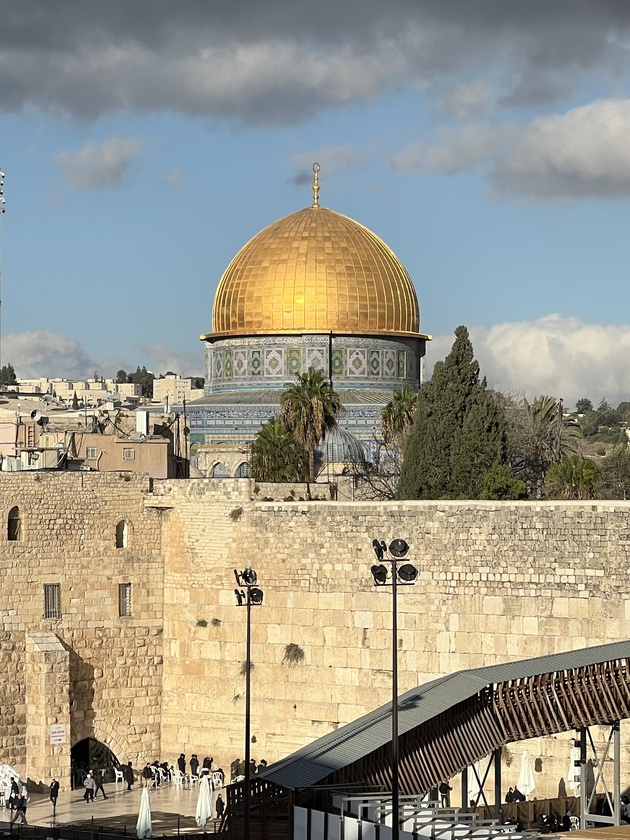I woke up in a rainy Jerusalem, feeling excited about the day, but also tired. It had been a long week of travel and work, however exciting and inspiring. I did some work, then walked in the rain to the closest Aroma Café for breakfast.
Just then, I received a message from an IDF soldier I'd been planning to meet at the border with Lebanon: the ceasefire meant that the soldiers were on the move to secure various critical goals before the fighting would have to stop.
My plans were canceled. I was disappointed, but I wished him well. I didn't quite know how my day would change, so I went on with my schedule. I had coffee with a cousin who is involved in engineering projects throughout Israel; I spoke to the Misgav Institute of Zionist Strategies about U.S. policy towards Israel in the second Trump administration. (Short version: likely to be good, but take nothing for granted, and find creative ways to meet Trump's own policy needs.)
I learned two things: one, that there are conservatives in Israel thinking of offering Trump a gradual cessation of U.S. aid in exchange for recognition of Israeli sovereignty in key areas; two, all of our knowledge is still so limited.
I returned to my Airbnb and decided to take a nap (with the aid of two glasses of wine) and reset my internal clock to Los Angeles time. I woke, worked, and decided to go for a run -- to the Kotel and the Haas Promenade, for the view.
I ran for two and-a-half hours and savored the winter afternoon light of the city. I prayed at the Kotel; I enjoyed the golden light of the walls of the Old City; I marveled at the colors along the promenade as the sun dipped low.
I ran back, past the YMCA in its Christmas glory. I showered, packed, and drove to Modi'in for dinner with one of my cousins. Then I headed to the airport, and finally to the flight home, which is where I am writing this.
I had a thought at random at the Kotel: my war is over. I don't know what that means. After all, there are still hostages in Gaza, and major threats. But I feel a sense of completeness. Was it Trump's win? Or maybe just hope? I don't know.
This week’s portion launches the great story of Abraham, who is told to leave everything of his life behind — except his immediate family — and to leave for “the Land that I shall show you.”
There’s something interesting in the fact that Abraham is told to leave his father’s house, as if breaking away from his father’s life — but his father, in fact, began the journey, moving from Ur to Haran (in last week’s portion). His father set a positive example — why should Abraham leave him?
Some obvious answers suggest themselves — adulthood, needing to make one’s own choices, his father not going far enough, etc.
But I think there is another answer. Abraham (known for the moment as Abram) needs to establish his own household. This is not just about making one’s own choice, but really about choosing one’s own starting point. It’s starting over.
Sometimes we start over in fundamental ways even if much that surrounds us remains the same. Sometimes the journey we have to ...
The story of Noah is familiar; the details, less so.
Noah is often seen as an ambivalent figure. He was righteous -- but only for his generation. What was his deficiency?
One answer suggests itself: knowing that the world was about to be flooded, he built an Ark for the animals and for his own family -- but did not try to save anyone else or to convince them to repent and change their ways (the prophet Jonah, later, would share that reluctance).
Abraham, later, would set himself apart by arguing with God -- with the Lord Himself! -- against the destruction of Sodom and Gomorrah, saying that they should be saved if there were enough righteous people to be found (there were not).
Still, Noah was good enough -- and sometimes, that really is sufficient to save the world. We don't need heroes every time -- just ordinary decency.
Hi all -- as I noted last month, I'm going to be closing down my Locals page, at least for tips and subscriptions -- I may keep the page up and the posts as well, but I'm no longer going to be accepting any kind of payment.
Look for cancelation in the very near future. Thank you for your support!

















